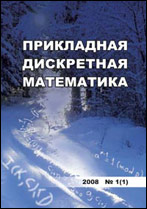|
This article is cited in 1 scientific paper (total in 1 paper)
Mathematical Backgrounds of Informatics and Programming
Relativized generic classes P and NP
A. N. Rybalov
Omsk State Technical University, Omsk, Russia
Abstract:
Classical theorem of Baker, Gill and Solovay states that there exist two oracles A and B such that PA=NPA, but PB≠NPB. This result indicates that the classical tools of computability theory (such as diagonalization) are inapplicable to prove the inequality P≠NP. Generic-case approach to algorithmic problems was suggested by Miasnikov, Kapovich, Schupp and Shpilrain in 2003. This approach studies behavior of an algorithm on typical (almost all) inputs and ignores the rest of inputs. Many classical undecidable or hard algorithmic problems become feasible in the generic case. In this paper we introduce generic analogs genP and genNP of the classical computational complexity classes P and NP. We prove a generic analog of the Baker–Gill–Solovay theorem: there exist two oracles A and B such that genPA=genNPA, but genPB≠genNPB. Therefore the diagonalization arguments cannot be applied to prove the inequality P≠NP in the generic case too.
Keywords:
generic complexity, P vs NP problem, oracles.
Citation:
A. N. Rybalov, “Relativized generic classes P and NP”, Prikl. Diskr. Mat., 2018, no. 40, 100–104
Linking options:
https://www.mathnet.ru/eng/pdm622 https://www.mathnet.ru/eng/pdm/y2018/i2/p100
|

| Statistics & downloads: |
| Abstract page: | 181 | | Full-text PDF : | 74 | | References: | 31 |
|




 Contact us:
Contact us: Terms of Use
Terms of Use
 Registration to the website
Registration to the website Logotypes
Logotypes









 Citation in format
Citation in format 
